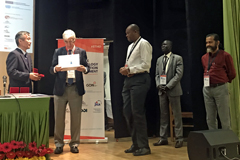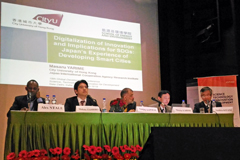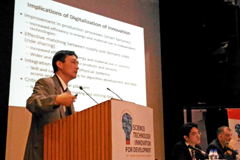JICA-RI Hosts Session on 'Science, Technology and Innovation' at 18th Global Development Conference in India
2018.03.30
The 18th Global Development Conference of the Global Development Network (GDN) was held on March 22-23, 2018, in New Delhi. The objectives of GDN are networking and developing the research capability of developing countries. The theme of this year's conference was "Science, Technology and Innovation for Development." About 300 people gathered from 46 countries. Naohiro Kitano, director, JICA Research Institute (JICA-RI), also participated.
On the first day, March 22, Kitano served as moderator for a session on the Japanese Award for Most Innovative Development Project, one of the Japanese Awards. The award is funded by the Government of Japan to identify and fund ongoing development projects on capacity development or job creation implemented by developing country NGOs.
Three finalists took the stage to speak about the theme of "Skills Development and Employment Generation." Abraham Bungkuac, country director, SERMA Africa, South Sudan, explained a project on addressing poverty through agribusiness, trading and research, that is introducing oil seed crop cultivation and oil extraction in South Sudan. Dipayan Dey, chair (research & planning), South Asian Forum for Environment, India, explained a hydroponic aqua-farming project for building capacities towards climate resilient agriculture in indigenous smallholders of Indian eco-region, which positions hydroponic aqua-farming as a means of making a living for people living on the water of Brahmaputra River in east India. George Onyango, executive director, Dandora Dumpsite Rehabilitation Group (DADREG), Kenya, explained a project to disseminate agricultural technology as an alternative means of making a living for women scavengers in Nairobi, Kenya.

Director Kitano (left) presented the Japanese Award to the finalists
The judging results were announced at the "Conclusion & Japanese Awards Prize Ceremony" on March 23. SAFE was chosen for first place, with Kitano presenting the award. SERMA Africa was chosen for second place, and DADREG for third. For Outstanding Research on Development, another Japanese Award, there was no first place. The research of Merve Sancak, University of Cambridge, UK and Yadeta Bekele, Jimma University, Ethiopia, were both chosen for second place. Sancak's research compared vocational training in the automobile industries of Mexico and Turkey, and Bekele's research was on the effects of acquiring coffee certification and of becoming a contract farmer for a better livelihood in Ethiopia.
The JICA-RI-hosted session "Facilitating Science, Technology and Innovation (STI) for the Sustainable Development Goals (SDGs): Experiences in India, Rwanda and Vietnam & Opportunities and Challenges in the Future" was held March 23. With Kitano serving as moderator, the following people took the stage: Masaru Yarime, associate professor, City University of Hong Kong, and visiting scholar, JICA-RI; Sanjay Lonial, assistant vice president TE Applications, Development Godrej Appliances, Godrej & Boyce Mfg. Co. Ltd.; Makoto Tashiro, Public Sector and Regional Sales Group, FUJITSU Limited; and Alex Ntale, director, ICT Chamber/Private Sector Federation, Rwanda. Each participant answered three questions: "What are the challenges to developing countries in achieving the Sustainable Development Goals?", "What opportunities can STI provide to developing countries for the SDGs?" and "How can developing countries make the best use of STI through public policy and institutional design?" Each participant also gave case studies.

Participants presented case studies from India, Rwanda and Vietnam
Yarime gave a presentation entitled "Digitalization of Innovation and Implications for the SDGs: Japan’s Experience of Developing Smart Cities." Lonial talked about work to develop and popularize low-energy, low-cost refrigerators that meet the needs of India's agricultural areas. Tashiro introduced an initiative to use mobile phones in Vietnam to make agriculture more efficient and minimize cost while maximizing agricultural safety and reliability. Ntale gave a presentation on the spread of ICT in Rwanda, particularly open innovation such as the Internet and fab labs, as well as their impact. The examples from India, Vietnam and Rwanda all involve JICA projects.
A lively Q&A with members of the audience followed. The resulting discussion affirmed that it is important to have innovation systems in place on the national level and to introduce space for private companies and individuals to innovate with the national government as a catalyst.

Masaru Yarime, JICA-RI visiting scholar, gave a case study on Japan’s experience of developing smart cities
The conference theme of "science, technology and innovation" is an area JICA-RI has focused on, most prominently in its joint research with the U.S. think tank Center for Strategic and International Studies (CSIS). This 18th Global Development Conference of the Global Development Network allowed JICA-RI to share information with researchers from various countries and regions, and it was a valuable opportunity that will benefit future JICA-RI initiatives.

事業事前評価表(地球規模課題対応国際科学技術協力(SATREPS)).国際協力機構 地球環境部 . 防災第一チーム. 1.案件名.国 名: フィリピン共和国.

事業事前評価表(地球規模課題対応国際科学技術協力(SATREPS)).国際協力機構 地球環境部 . 防災第一チーム. 1.案件名.国 名: フィリピン共和国.

事業事前評価表(地球規模課題対応国際科学技術協力(SATREPS)).国際協力機構 地球環境部 . 防災第一チーム. 1.案件名.国 名: フィリピン共和国.

事業事前評価表(地球規模課題対応国際科学技術協力(SATREPS)).国際協力機構 地球環境部 . 防災第一チーム. 1.案件名.国 名: フィリピン共和国.

事業事前評価表(地球規模課題対応国際科学技術協力(SATREPS)).国際協力機構 地球環境部 . 防災第一チーム. 1.案件名.国 名: フィリピン共和国.
scroll